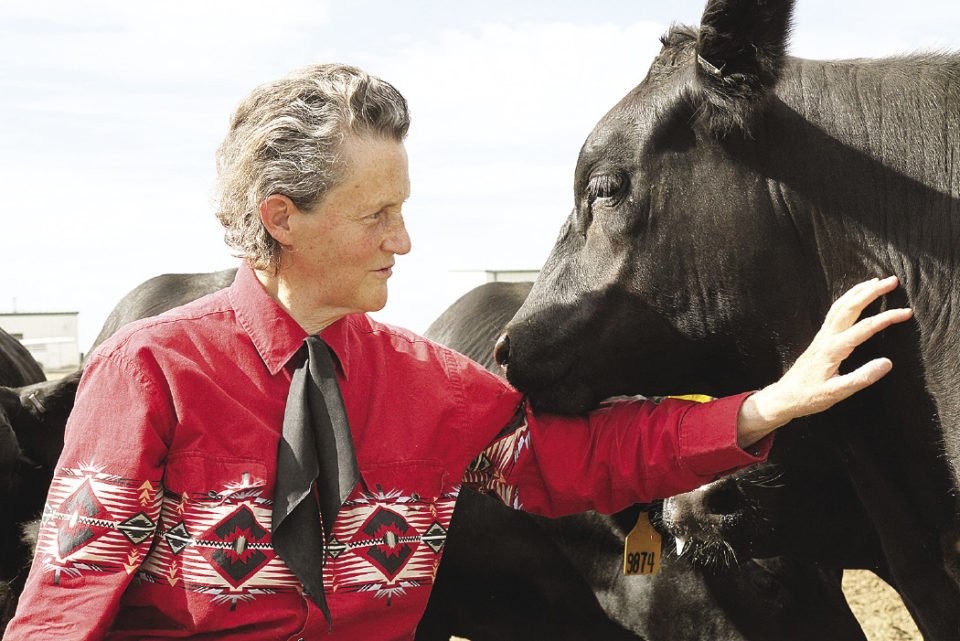Rainy, my yellow Lab, wasn’t expecting the trash bags on our morning walk. My neighbor had piled the black sacks at the end of his driveway for pick up. Rainy didn’t know that. What he did know was the sacks weren’t there the last time we walked by. Stiff legged, with the hair on his neck and shoulders standing up, the dog cautiously approached within a few feet of the sacks and stopped.
“Woof,” said Rainy. “Woof, woof!”
I called him to come and we continued on our walk. Some folks may think Rainy’s behavior was silly or fearful, although anyone whose spent time around animals would not be surprised that he acted as he did. When told of the incident during a recent interview, animal behavior expert Temple Grandin said Rainy had a normal response to an unfamiliar sight, the trash sacks, in familiar surroundings.
“Animals notice things that are different or out of place,” she said. “It may be a threat.”
Grandin, a professor of animal sciences at Colorado State University and the author of several books, including Animals in Translation and Animals Make Us Human, will be presenting at a day-long session in Thunder Bay April 2. We spoke by phone about how animals think. Grandin, who is autistic, is renowned for her special insight on that subject.
“I’m a visual person,” she said. “I think in pictures.”
Animals, she found, think in similar ways.
“Animals don’t think in words,” she said. “They are sensory; relying on sight, sound and smell.”
Dogs, for instance, have a scent-based social life, as anyone who has gone for a walk with one knows. Sniffing at the base of a tree, a dog learns what other canines have been there. Perhaps the tree has been visited by a potential mate, or a canine friend or foe. The dog can derive and process all this information and more with a few sniffs.
Grandin said dogs are also visual. She knew of an abused dog that was afraid of men in baseball hats, because it had been beaten by a man wearing a baseball hat. Animals learn from experience, so the dog associated men in baseball hats with a previous trauma in its life.
Megan Corgan, one of Grandin’s graduate students, recently trained a colt to walk past a plastic child’s playset. The young horse had never seen the playset or a child playing with it. The playset was simply an object. After the horse walked past the playset 30 times, it was turned 90 degrees. Although a human would recognize it as the same playset, for the horse it became a totally new object. The colt refused to walk past it.
Prey animals must experience predators to learn how to avoid or respond to them. Grandin said Dr. Reinaldo Cooke, a researcher at Oregon State University, found that cattle which had experienced wolf attacks showed much higher stress levels when exposed to barking German shepherds (simulating wolves), wolf urine and sounds of wolf howls than cattle which had not dealt with wolves. Other research has found cattle which have been harassed by wolves cannot be worked with dogs. In fact, they hate dogs.
“That’s a learned experience,” Grandin said.
Apparently, cattle may be able to learn how to fend off wolves. She said California rancher Mark Coats is teaching cattle to gather as a herd when harassed by wolves, because the predators typically attack prey they separate from the group. This is similar to the way wild musk oxen form a circle facing outward when attacked.
Grandin said animals are intelligent, but they don’t share aspects of human intelligence. Physically, the difference is that humans have a larger cortex in their brain, meaning we have, in essence, a larger internal computer with which to process information. A dog cannot build a house, do higher math or write a novel. However, humans lack the navigational abilities of homing pigeons.
Our emotional systems are very similar. Grandin said the late neuroscientist Jaak Panksepp identified seven basic emotions that all mammals have, including humans. They are: fear, anger, mother-young nurturing, separation distress, seek (the urge to explore), sex and play. Emotions allow animals to have complex social lives. Dogs have friends. Sister calves will graze together. Grandin said ranchers have told her that when they lead ear-tagged calves through a chute, they will come back the following year and go through the chute again in nearly the same order.
While some humans may believe that animals don’t think and that all behavior is instinctive, Grandin emphatically said that assumption is wrong. Instinctive behavior is not learned, but is hard-wired in the brain. When a male dog lifts his leg to urinate, that’s an instinctive behavior.
The depth of a dog’s learned behavior is based upon a very good memory. That’s how dogs are able to learn a vocabulary of words, even though they are unable to use words to think. Memory can also help explain remarkable dog behavior.
I shared a personal story with Grandin. When my late partner Vikki reached her final day, our dog Tanner, who had been her nearly constant companion while she was ill, crawled beneath her bed. When, amidst a roomful of loved ones, she breathed her last, Tanner was aware of it before me, even though I was leaning over her as it happened. Tanner came out from beneath the bed, rushed across the room, grabbed the hospice nurse by the sleeve and pulled her to Vikki’s side. Everyone who was there agreed it was an extraordinary occurrence.
“The dog knew,” Grandin said. “If he had experienced death, he knew it was the end and went for help. The emotion was separation distress, not fear.”
Tanner had experienced death, both of dogs and people. He also doubtlessly knew Vikki was grievously ill. To have the opportunity to hear the scientific explanation of his behavior from Grandin helped me understand what occurred. But I remain in awe of what I witnessed that day. Science can identify the seven basic emotions we share with dogs and other creatures. But it doesn’t explain how those emotions can be expressed in such wonderful ways. Grandin is right. Animals make us human.
Note: The Thunder Bay presentation and conference with Temple Grandin on Thursday, April 2 has been cancelled due to coronavirus.






